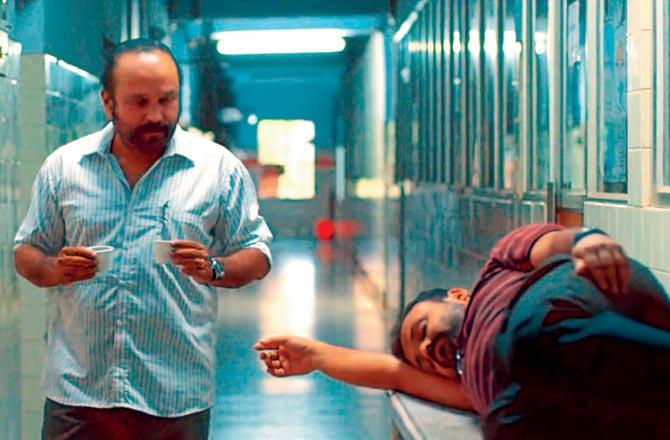A talk by a film studies professor and a sociocultural anthropologist will discuss films based on the worldwide spread of diseases

A still from The Flu
The sudden popularity of Steven Soderbergh's 2011 thriller Contagion isn't surprising; it bears an uncanny resemblance to the world we're living in right now. But it isn't the only film to do so. Today, a virtual discussion titled Pandemics in Cinema: Filming the Invisible Enemy by Columbia Global Centers, Mumbai, will highlight how cinema has tackled the subject. It will be helmed by the centre's director, sociocultural anthropologist Ravina Aggarwal and Richard Peña, director emeritus, New York Film Festival and professor of film studies, Columbia University. And in an email interview, Peña tells us that the idea for this event came about naturally.
ADVERTISEMENT

In the American film Contagion, Peña says, "the virus kills well-placed and successful business people as well as waiters and cooks in a restaurant — weirdly, the virus brings us together, shows our common humanity, again at a time in which America seems divided along numerous vectors"
"We decided we would especially like to emphasise a cross-cultural approach, as pandemic films have appeared in a number of national cinemas. Ravina's background in social anthropology was crucial in creating this focus," he says.

In the Malayalam film Virus, he observes that the team of contact tracers comprise a Hindu, Muslim and Christian - "A small thing, but that the heroes come from a 'multi-cultural' India seems significant," he adds. Pics/Facebook, Youtube
Filmmakers are often known to exercise creative liberties with regards to scientific and historic accuracy in their work. When it comes to pandemic-centric films, how often has that been the case? Peña states that science fiction films tend to be weak especially in the area in which science fiction literature is strong: in science itself. "Part of that is the [filmmaker's] problem of expressing, as part of a dramatic narrative, the lengths of time science usually takes to make real advances," he adds.

Ravina Aggarwal
A good example of this, he informs, is the South Korean film The Flu where at the end a little girl who is believed to have antibodies to the disease is found, and it is announced that the production of a vaccine is underway. "But as one can know from reading the news, it takes weeks, if not years, to develop effective vaccines, and thus given the earlier announcement in the film that the disease takes only 36 hours to kill its victims, it seems at best a Pyrrhic victory — despite the swelling music at the end. But of course, the film, even though it's called The Flu, is much less about the disease than about how South Korea might act during such an event," he quips.

Richard Pena
Peña believes that especially in the US and Western Europe, the "theatrical model" of going to specialised sites ie cinemas to view the projection of moving images is on the decline. "Since 1992, the income in the US, at least, for home video (VHS, DVD, etc) has been greater than theatrical presentations and that trend has only increased," he informs. In the next couple of years, Peña sees the closing of many movie theatres across these countries, except in Mexico and China where he has witnessed contradictory evidence. From today's discussion, he hopes that filmgoers will be inspired to dig a little deeper into the themes and images that inform even what we might call "popular entertainment."
On Today, 6.30 pm to 7.30 pm
Log on to https://globalcenters.columbia.edu/events/mumbai-pandemic-films (to register)
Catch up on all the latest Mumbai news, crime news, current affairs, and a complete guide from food to things to do and events across Mumbai. Also download the new mid-day Android and iOS apps to get latest updates.
Mid-Day is now on Telegram. Click here to join our channel (@middayinfomedialtd) and stay updated with the latest news
 Subscribe today by clicking the link and stay updated with the latest news!" Click here!
Subscribe today by clicking the link and stay updated with the latest news!" Click here!






